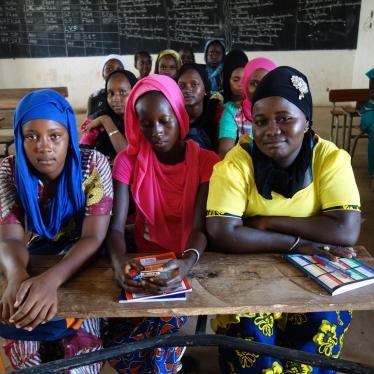(New York) - The Pakistani government must honor its pledge to amend the controversial Hudood Ordinances by removing some of its most discriminatory and dangerous provisions, Human Rights Watch said today.
Human Rights Watch urged the National Assembly to table the Women’s Protection Bill in its current session. The Pakistani government of General Pervez Musharraf has said the National Assembly will soon consider amendments to the Hudood Ordinances, which criminalize adultery and non-marital sex, but the government has repeatedly reneged on such assurances in the past.
“General Musharraf claims he is an ‘enlightened moderate’ in favor of women’s rights, but so far he has been all talk and no action,” said Ali Dayan Hasan, South Asia researcher at Human Rights Watch. “Failure to act this time will irrevocably damage his credibility.”
In the face of calls for reform by the government-run National Commission on the Status of Women, international and Pakistani women’s rights and human rights groups and the media, the government has repeatedly promised – and failed – to repeal or reform the Hudood Ordinances. This set of laws, enacted in 1979, makes rape victims liable to prosecution, and has led to thousands of women being imprisoned for so-called “honor” crimes. The laws rendered most sexual assault victims unable to seek redress through the criminal justice system, deeming them guilty of illegal sex rather than victims of unlawful violence or abuse.
In September, the party backed by Musharraf, the Pakistan Muslim League, reached an agreement with the moderate opposition Pakistan Peoples Party (PPP) to make procedural changes to the Hudood Ordinances that would permit rape victims to file charges under the criminal law instead of religious law, which requires producing four male witnesses to guarantee proving rape. Amendments would also allow women charged with adultery to post bail, though it would leave many other discriminatory provisions in place.
But Musharraf backtracked on the accord to seek an alternative agreement on amending the Hudood Ordinances with the Islamist Muttaheda Majlis-e-Amal (MMA) alliance, which opposes any meaningful changes. That agreement failed to materialize.
In a meeting with Human Rights Watch on September 19, Law Minister Wasi Zafar stated that he spoke with “the full authority of the government” in saying that the Women’s Protection Bill would be “presented as agreed” between the ruling coalition and the opposition PPP in the next session of the National Assembly. The government subsequently announced that it would submit the bill in its original form to the National Assembly in the session currently in progress. .
“The government must present the draft bill to parliament as agreed with the PPP to ensure that Pakistani women finally get at least some of the rights long denied to them,” said Hasan. “It is time for the government to stop dithering and honor its word.”
Human Rights Watch emphasized that despite its positive provisions, the draft Women’s Protection Bill fails to comply with many of Pakistan’s obligations under the Convention on the Elimination of Discrimination Against Women, which calls on states to modify or abolish laws that discriminate against women. The amendments fail to address fundamental problems with the Hudood Ordinances, such as the discriminatory provisions that criminalize sex outside of marriage and fail to recognize marital rape. However, Human Rights Watch said Pakistan’s failure to address all these issues should not be used as an excuse to address none.
Human Rights Watch called on Pakistan to decriminalize adultery and non-marital consensual sex, and to adopt rules of evidence that give equal weight to testimony given by men and women. Further, Pakistan should raise public awareness about the laws and better train police to deal with victims of sexual assault, and improve support services such as shelters and burn units for women.
“The Hudood Ordinances are hopelessly flawed and should be repealed, but this bill will provide at least modest relief to victims,” said Hasan. “Then it will be time to address the remaining problems.”






